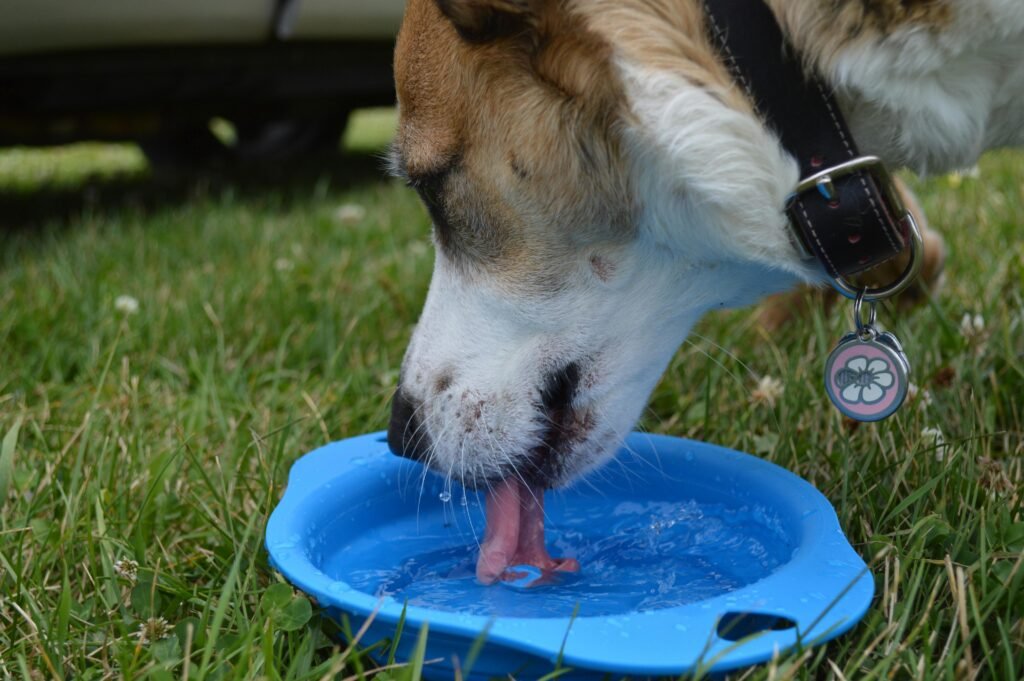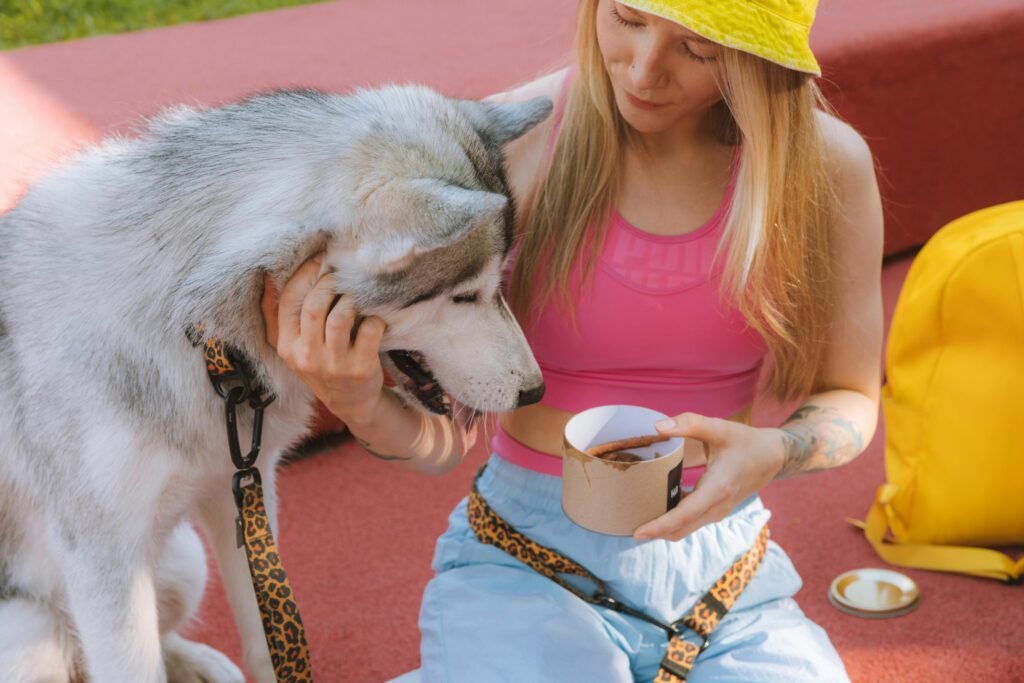Have you ever wondered how long dogs can go without food? Just like us, our little companions have unique needs and limits too. While they can survive 3-5 days without eating, but it’s not just about survival—it’s about their well-being and health. In this blog, we’ll explore the factors that affect a dog’s ability to go without food, what to watch for, and how to make sure your pet stays happy and healthy, even when they’re off their chow. So, let’s dive into the world of canine nutrition and find out what you need to know to keep your pup in tip-top shape!

Understand Your Dog’s Basic Nutritional Needs
Feeding your dog isn’t just about filling their bowl; it’s about giving them the right food to make them healthy, happy, and full of energy. Here’s what you need to know:
1. Protein Power
Think of protein as the building block for your dog’s muscles, skin, and fur. Good sources include meat, fish, and eggs. Dogs need plenty of protein to keep them strong and active.
2. Carb Energy
Carbohydrates are like the gas in your dog’s energy tank. They come from grains, vegetables, and some fruits. Whole grains and veggies like sweet potatoes are excellent options that provide lasting energy.
3. Healthy Fats
Fats are essential for brain health, a shiny coat, and overall energy. Good fats come from sources like fish oil, chicken fat, and flaxseed. They’re like the premium oil that keeps your dog running smoothly.
4. Vital Vitamins
Vitamins are crucial for your dog’s immune system, vision, and overall growth. Vitamin A, B, C, D, E, and K are all important, and they come from various fruits, vegetables, and animal products.
5. Minerals
Minerals like calcium, phosphorus, and potassium are key for strong bones, teeth, and overall health. These come from meat, bone meal, and vegetables.
6. Water, Water, Water
Just like us, dogs need plenty of water. It’s vital for digestion, circulation, and temperature regulation. Always ensure your dog has access to fresh, clean water
Feeding your dog a balanced diet is one of the best thing a dog owner can do (according to me). Pay attention to their needs, check with your vet if you’re unsure, and enjoy the fun of seeing your little friend thrive!

What Makes Your Dogs Go Without Food?
Several factors can cause a dog to go without food, ranging from health issues to environmental changes. Here are some common reasons:
1. Illness
Dogs may refuse to eat due to medical conditions such as gastrointestinal issues, infections, dental problems, kidney disease, or other illnesses. Pain and discomfort can significantly reduce their appetite.
2. Stress and Anxiety
Changes in the environment, such as moving to a new home, the addition of a new pet or family member, or loud noises (like fireworks or thunderstorms), can cause stress and anxiety, leading to a loss of appetite.
3. Dietary Changes
Sudden changes in a dog’s diet can lead to food refusal. Dogs may be picky or sensitive to new ingredients, flavors, or textures.
4. Medications
Some medications can have side effects that include loss of appetite. If a dog is on medication, this could be a contributing factor.
5. Behavioral Issues
Dogs may refuse to eat due to behavioral problems or if they are used to eating table scraps and are being transitioned to dog food.

6. Age
Older dogs may experience a decrease in appetite due to a slower metabolism, dental issues, or changes in their senses of taste and smell.
7. Parasites
Internal parasites like worms can cause a dog to lose their appetite.
8. Vaccinations or Treatments
Recent vaccinations or treatments can temporarily affect a dog’s appetite due to mild side effects.If a dog refuses to eat for more than 24 hours, it is essential to consult a veterinarian to rule out any underlying health issues and to ensure they receive appropriate care and treatment.
If your dog stops eating for more than a day or two, or if they seem sick or down, it’s best to check with your vet to find out why.
How Long Can Dogs Go Without Food?
Dogs can typically go without food for about 3 to 5 days, but this can vary depending on factors like age, size, and health. For example:-
Healthy Adult Dogs: Generally, healthy adult dogs can go without food for about 3 to 5 days.
Puppies: Puppies have higher energy requirements and should not go more than 24 hours without food.
Senior Dogs: Senior dogs may have specific dietary needs and should be monitored closely if they refuse food.
Smaller dogs or puppies might need to eat more frequently than larger dogs. If your dog refuses food for more than a day or two, it could be a sign of illness or stress. Always keep an eye on your dog’s eating habits and consult a vet if you’re concerned. It’s important to provide regular meals to keep your dog healthy.
Signs Your Dog Is Not Eating Enough

Behavioral Signs: Changes in appetite, lethargy, or reluctance to eat.
Physical Symptoms: Weight loss, dehydration, or vomiting.
When to Be Concerned: If your dog hasn’t eaten for more than 24 hours or shows signs of distress, consult a veterinarian promptly.
Health Risks of Prolonged Fasting in Dogs
Short-term Effects: Weakness, organ dysfunction, and compromised immune system.
Long-term Consequences: Muscle loss, nutrient deficiencies, and potentially irreversible damage.
Worse Conditions : Underlying medical conditions can worsen without adequate nutrition.
What to Do If Your Dog Stops Eating?
Immediate Steps: Offer tempting, nutritious food options and monitor their response.
Consult a Veterinarian: If your dog continues to refuse food or shows signs of illness.
Encouragement Tips: Warm the food, offer small meals throughout the day, and ensure access to fresh water.

How To Ensure Your Dog Eats Regularly?
Establishing a Feeding Routine: Consistency helps regulate your dog’s appetite.
Choosing the Right Food: Select high-quality dog food that meets their nutritional needs.
Hydration: Ensure your dog drinks enough water to support digestion and overall health.
Frequently Asked Questions
Q1. How Long Can Dogs Go Without Eating?
Healthy adult dogs can usually go without food for 3 to 5 days, but this depends on the health of your dog and their surroundings.
Q2. Is It Normal For A Dog To Skip A Meal?
Skipping meals occasionally is natural, but if they are refusing to eat their meals on continuous basis, then this might be a cause for concern. Don’t ignore it. Visit the veteran near you to check if your dog have any health problems.
Q3. Are There Any Safe Fasting Practices For Dogs?
To fast your pets, simply cut out all their food for a day. If you normally feed them once daily, they will go without food for 48 hours. If you feed them twice a day, a one-day fast will last 24 hours. Make sure they drink plenty of water during the fast.
Q4. What Are The Signs Of Malnutrition In Dogs?
Common symptoms of malnutrition in dogs include weight loss, tiredness, skin issues, poor appetite, behavioral changes, weakness, digestive issues or poor dental health. Look out for these symptoms and consult veteran for any treatment.
Q5. How Can I Improve My Dog’s Appetite?
Try giving you dogs smaller and more frequent meals. Slightly warming their food to enhance its aroma. Add appealing toppings such as broth or wet food to make it more tasteful for them.
Q6. Is It Safe To Change My Dog’s Diet Suddenly If They’re Not Eating?
Changing your dog’s diet suddenly is generally not recommended, as it can lead to digestive issues, such as diarrhea or vomiting or upset stomach. Mix a small amount of the new food with the old food and eventually increase the new food while decreasing the old food over 7-10 days. Also, ensure there are no dental problems discomforting them while eating.
Q7. What Are Some Common Causes Of A For Refusing To Eat?
Causes include illness, dental problems, stress, changes in environment, or food aversion.
Q8. Can Dehydration Affect My Dog’s Appetite?
Yes, dehydration may reduce appetite and energy, so make sure your dog has access to clean and fresh water.
Final Words
Understanding how long a dog can go without eating is important for a good pet owner. Pay attention to your dog’s eating habits and act quickly if something changes. This helps in keeping your dog healthy and happy. Always talk to a vet for advice on your dog’s diet.
